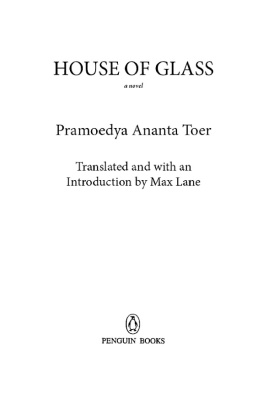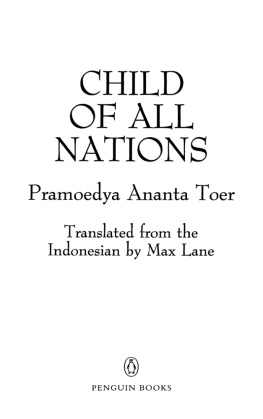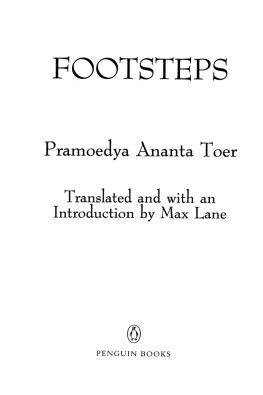PENGUIN BOOKS
HOUSE OF GLASS
Pramoedya Ananta Toer was born on the island of Java in 1925. He was imprisoned first by the Dutch from 1947 to 1949 for his role in the Indonesian revolution, then by the Indonesian government as a political prisoner. Many of his works have been written while in prison, including the Buru Quartet (This Earth of Mankind, Child of All Nations, Footsteps, and House of Glass), which was conceived in stories the author told to other prisoners during his confinement on Buru Island from 1969 to 1979.
Pramoedya is the author of thirty works of fiction and nonfiction. His novels have been translated into twenty languages. He received the PEN Freedom-to-write Award in 1988 and the Ramon Magsaysay Award in 1995. He is currently under city arrest in Jakarta, where his books are banned and selling them a crime punishable by imprisonment.
Max Lane was second secretary in the Australian embassy in Jakarta until recalled in 1981 because of his translation of Pramoedyas Buru Quartet.
HOUSE OF GLASS
a novel
Pramoedya Ananta Toer
Translated and with an
Introduction by Max Lane
PENGUIN BOOKS
Published by the Penguin Group
Penguin Group (USA) LLC
375 Hudson Street
New York, New York 10014
USA | Canada | UK | Ireland | Australia | New Zealand | India | South Africa | China
penguin.com
A Penguin Random House Company
First published in Australia by Penguin Books Australia Ltd. 1992
First published in the United States of America by William Morrow and Company, Inc. 1996
Reprinted by arrangement with William Morrow and Company, Inc.
Published in Penguin Books (USA) 1997
Copyright 1988 by Pramoedya Ananta Toer
English translation copyright 1992 by Max Lane
Penguin supports copyright. Copyright fuels creativity, encourages diverse voices, promotes free speech, and creates a vibrant culture. Thank you for buying an authorized edition of this book and for complying with copyright laws by not reproducing, scanning, or distributing any part of it in any form without permission. You are supporting writers and allowing Penguin to continue to publish books for every reader.
Originally published in Indonesian by Hasta Mitra Publishing House, Jakarta, 1988.
THE LIBRARY OF CONGRESS HAS CATALOGED THE MORROW EDITION AS FOLLOWS:
Toer, Pramoedya Ananta, 1925
[Rumah kaca. English]
House of glass : a novel/Pramoedya Ananta Toer: translated and introduced by
Max Lane.1st ed.
p. cm.
Originally published: Australia: Penguin, 1992.
ISBN: 978-1-101-61535-5
I. Title.
PL5089.T8R8613 1996
899.22132dc20 9546294
Deposuit Potentes de Sede et Exaltavit Humiles.
(He has brought down the mighty from their thrones and raised up the lowly.)
TRANSLATORS NOTE
This is a novel set in a time prior to the establishment of an official national language and when the choice of language was intimately tied up with social status and power. I have thus tried to preserve as much as possible of the different usages, including honorifics, of the original. These are usually Malay, Javanese, and Dutch terms. These are italicized the first time they appear. If explanations or translations are required, they can be found in the Glossary at the back of this book. The Glossary also includes some English terms and acronyms that may not be familiar to the English-speaking reader.
This is the fourth translators note I have written for this series. During the course of translating and revising and refining the translations, a process which I am sure will continue into the future, a large number of people have helped. I must take the opportunity of this final translators note to thank all of them, especially Kerry and Caroline Groves, the late R.F.X. Brissenden, Blanche dAlpuget, Jackie Yowell, and Elizabeth Flann. A special mention must be made of the late Dr. Geoff Blunden, who put considerable effort into editing the manuscript of This Earth of Mankind.
I must also express deep gratitude to Pramoedya Ananta Toer, Hasyim Rahman, and Yusuf Isak, who together provided permission, support, and most important of all, inspiration to finish this project. Indeed, I thank all my friends in Indonesia for the inspiration that they have given.
Finally I thank Anna Nurfia and Melanie Purwitasari, who have been tolerant of my absences, both physical and mental, while I have been working on this project.
INTRODUCTION
House of Glass is the fourth volume of Pramoedya Ananta Toers novels inspired by the life of one of the pioneers of the Indonesian national awakening and of Indonesian journalism, Tirto Adi Suryo. These novels, along with other manuscripts, were written in the last period of his fourteen years of imprisonment under barbaric conditions on the prison island of Buru in Eastern Indonesia. Pramoedya, along with thousands of others, was imprisoned in Jakarta jails and the Buru Island concentration camps without ever being tried and sentenced. Many, including Pramoedya, were beaten or suffered torture. Many died during their imprisonment.
Pramoedya obtained writing materials and the opportunity to write only in the last few years of his time at Buru. Prior to this he had narrated to his fellow prisoners the story of Minke, Annelies, Nyai Ontosoroh, Robert Suurhof, and the other characters of This Earth of Mankind, Child of All Nations, Footsteps, and House of Glass. He had to rely on his memory of the historical research he had undertaken in the early 1960s to be able to capture the detail and color of the Netherlands Indies of the early twentieth century.
House of Glass is not only the final volume of the tetralogy. It is also the finale. The story begins with the event that ended the third volume the arrest of Minke. His newspaper has been banned after his young assistants published a biting editorial attacking the governor-general of the Netherlands Indies. The policeman, Pangemanann, takes Minke away while Princess Kasiruta, Minkes wife, is visiting her father in a village nearby.
Those who have followed the saga of Minke might have been afraid that the story would now be at an end. For Pramoedya, however, Minkes absence provides the opportunity to reveal who has been the real protagonist of these four novels. It is true that we, as readers, have been taught a great deal through observing the actions and following the thoughts of Minke. We have watched him develop from a naive and somewhat self-centered teenager to a mature and experienced man of politics, yet still complex and subject to human foibles. A man of vision, he saw, before any other, the nature of Indonesias future as an amalgam of peoples united behind revolutionary political goalsbefore the word Indonesia had even been invented.
Minke was at the center of the maelstrom created by the unleashing of a whole range of social forces as the awakening of the Indonesian consciousness met a seemingly irresistible forcecolonialism. And this awakening was not the product of some mystical or metaphysical process. It was brought about by changes in the material world: Java being turned into a sugar plantation crisscrossed by railways; rivalry and war between colonial powers; the spread of the printing press and formal schooling; the upheavals caused by other Asian peoples struggles for liberation; the telegraph, the automobile, the steamship, the camera. The impact of all these changes on the consciousness of the natives of the Indonesian archipelago found its most concentrated form in the new personalities it created. And in Minkes development, Pramoedya has been able to exemplify the path of these changes. Minke did not simply mature from a teenager to an adult. His development exemplified the formation of a kind of personality that had never before existed in Javanese or Sumatran or Timorese or Celebes society. He represented a new form of social being.
Next page











